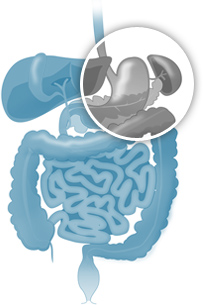Gastric and duodenal ulcers
 Definition
Definition
Peptic ulcer disease is a chronic condition characterized by spontaneous attacks followed by healing phases. It is caused by the presence of acid and is almost always the result of a gastric infection by Helicobacter pylori.
Taking aspirin or anti-inflammatory drugs can cause multiple iatrogenic ulcers that often remain superficial.
Epidemiological data
This condition has a prevalence of about 10% and 3 new cases per 1 inhabitants appear each year. A family history is present in 000% of cases.
Duodenal ulcer is 3-5 times more common than gastric ulcer. A double localization (gastric and duodenal), simultaneously or not, occurs in 10 to 20% of cases.
This condition is not very common before 40 years of age, it grows after that, with a peak between 55 and 65 years of age. It affects both men and women equally..
Symptoms of the disease
The symptoms of gastric and duodenal ulcers are more or less the same:
pain in the epigastric and hypochondrium;
• dorsal irradiation;
• anorexia;
• weight loss;
• nausea:
• vomiting;
• heartburn (a burning sensation extending from the epigastrium to the throat, often accompanied by the discharge of acidic liquid);
• bloating;
• belching.
Treatments
• Medical treatment, which aims to relieve the painful syndrome and heal the ulcer, recommends the use of gastric antisecretors (proton pump inhibitors, anti-H2), mucoprotectants and antacids, antibiotics to eradicate Helicobacter pylori.
• Surgical treatment of gastric ulcer is very rare. It is recommended in the event of a complication that is not related to medical treatment. As for duodenal ulcers, interventions have almost disappeared due to advances in medical treatment.